

ALSO BY THE AUTHOR
Kidnapped Souls:
National Indifference and the Battle for Children
in the Bohemian Lands, 19001948
The Lost Children: Reconstructing Europes Families
after World War II
Copyright 2016 by Tara Zahra
All rights reserved
First Edition
For information about permission to reproduce selections from
this book, write to Permissions, W. W. Norton & Company, Inc.,
500 Fifth Avenue, New York, NY 10110
For information about special discounts for bulk purchases,
please contact W. W. Norton Special Sales at
specialsales@wwnorton.com or 800-233-4830
Book design by Fearn Cutler de Vicq
Production manager: Louise Mattarelliano
ISBN 978-0-393-07801-5
ISBN 978-0-393-28559-8 (e-book)
W. W. Norton & Company, Inc.
500 Fifth Avenue, New York, N.Y. 10110
www.wwnorton.com
W. W. Norton & Company Ltd.
Castle House, 75/76 Wells Street, London W1T 3QT
to William Irvine
F austina Wi niewska was counting the days until she could return home. I do not understand how the people there look upon this America, she wrote to her parents. They think that a country like America is made of gold. This is not a golden country, but a new one,... and here they exploit people as they did the Jews in Pharaohs time, 12 hours work a day. Faustina, a recent Polish immigrant, was not impressed by electric lights or by the Statue of Liberty. Assaulted by the sounds, sights, and foul smells of New York City, she moaned, Oh, how lonely I am! Here you only hear the noise of thousands of people walking, of the whistling of factories, of the bells of trolleys... in place of nightingales and larks. Instead of roses, tulips, and lilacs, barrels of garbage and covered wagons, and stench instead of fresh air. She had abandoned any fantasy of prosperity, yet her parents constantly nagged her to send money home. She and her husband were living hand to mouth. We cannot live on smelly meat, stale bread, musty cereals.... To live in misery or to kill myself in order to save a grosz, no, I am not that crazy to work myself to death. She refused, on principle, to sacrifice her few daily pleasures in order to support needy
niewska was counting the days until she could return home. I do not understand how the people there look upon this America, she wrote to her parents. They think that a country like America is made of gold. This is not a golden country, but a new one,... and here they exploit people as they did the Jews in Pharaohs time, 12 hours work a day. Faustina, a recent Polish immigrant, was not impressed by electric lights or by the Statue of Liberty. Assaulted by the sounds, sights, and foul smells of New York City, she moaned, Oh, how lonely I am! Here you only hear the noise of thousands of people walking, of the whistling of factories, of the bells of trolleys... in place of nightingales and larks. Instead of roses, tulips, and lilacs, barrels of garbage and covered wagons, and stench instead of fresh air. She had abandoned any fantasy of prosperity, yet her parents constantly nagged her to send money home. She and her husband were living hand to mouth. We cannot live on smelly meat, stale bread, musty cereals.... To live in misery or to kill myself in order to save a grosz, no, I am not that crazy to work myself to death. She refused, on principle, to sacrifice her few daily pleasures in order to support needy
Faustina took part in one of the greatest migrations in human history. Between 55 and 58 million Europeans moved to North and South America in the period 18461940. At the peak of this exodus, in the first decade of the twentieth century, Austria-Hungary was the top supplier of migrants to the United States, sending more than 2 million subjects of the Dual Monarchy through the gauntlet at Ellis Island. Moans are uttered by people here because it seems that all of Europe is depopulating itself and is heading in droves for America, Faustina attested.
When Faustina made her journey, the phenomenon of mass emigration from Eastern Europe was still relatively novel. Before the age of the steamship, the journey across the Atlantic was long (averaging thirty to forty days), expensive, and potentially deadly. But by 1890, when Faustina left home, transatlantic emigration was far less dangerous and somewhat more comfortable, even in steerage. Expanding railway lines and steamship routes reduced the time, cost, and risks of transatlantic travel, and narrowed the psychological distance between Eastern Europe, Western Europe,
The sudden departure of millions of citizens to foreign lands sent shock waves across Europe and the Atlantic. If the arrival of the unwashed masses from Southern and Eastern Europe inflamed xenophobia in Western Europe and the United States in the early twentieth century, those who stayed behind were no less unsettled. Military officials bemoaned the growing number of conscripts who failed to appear for military duty. Landowners worried about where they would find workers to harvest the next years crop (and about the need to increase wages to compete in a global labor market). Religious authorities warned that peasants would be demoralized and secularized in foreign cities. Family members despaired that they might never see their relatives again. To many, America fever (and its cousins Brazil fever and Argentinia fever) threatened to destroy individuals, families, and nations.
Faustinas trajectory was not unique. But in her letters home, Wi niewska also challenged the story that Americans like to tell themselves about this great departure: that immigrants desired to come and to staynot that many came reluctantly, pushed by circumstances at home, feeling that they had no other options, and that many wished mightily to return home again. The great story of immigration has generally focused on how many persons the United States (or other receiving countries) would allow in, or keep out, not on the situations those migrants sought to escape, or on the impact of their departure on their homelands, or the role of their own governments in keeping them home. Significantly, it has tended to ignore one of the most consequential political discoveries of nineteenth-century European states: that emigration could be manipulated like the steam valve on a teapot; that encouraging people to stay or go could be used as an instrument of policy, to serve both domestic and international goals. People could be scientifically managed, like any other natural resource.
niewska also challenged the story that Americans like to tell themselves about this great departure: that immigrants desired to come and to staynot that many came reluctantly, pushed by circumstances at home, feeling that they had no other options, and that many wished mightily to return home again. The great story of immigration has generally focused on how many persons the United States (or other receiving countries) would allow in, or keep out, not on the situations those migrants sought to escape, or on the impact of their departure on their homelands, or the role of their own governments in keeping them home. Significantly, it has tended to ignore one of the most consequential political discoveries of nineteenth-century European states: that emigration could be manipulated like the steam valve on a teapot; that encouraging people to stay or go could be used as an instrument of policy, to serve both domestic and international goals. People could be scientifically managed, like any other natural resource.
THE STORY OF mass migration has also generally accepted the premise that more mobility meant more freedom. In American political culture, the meaning of the term freedom has never been stable, but it has long been defined in relation to movement. Among eighteenth-century political theorists, Thomas Jefferson was one of the most ardent defenders of the right to exit. He insisted that all men possess a right which nature has given to all men of departing from the country which chance, not choice, has placed him.
In the United States, of course, imagined links between freedom and mobility also reflect the centrality of the frontier to American history and identity. Frederick Jackson Turners 1893 address entitled The Significance of the Frontier in American History is certainly the most famous version of the myth of frontier individualism. Turner asserted that movement had been the dominant fact of American life since Columbuss arrival in the New World. The American conquest of the West transformed Europeans into Americans and bestowed on them a unique attachment to freedom, individualism, and democracy. In Turners view, physical mobility, social mobility, and political liberty naturally converged in the American West.
Like the movement west, mass immigration tethered the concepts of freedom and mobility in the United States. Mass immigration helped transform freedom into an imagined space or a
In reality, however, from the very moment that the mass exodus from Eastern Europe began, many Europeans questioned the notion both that emigration should be unrestricted and that moving would lead to freedom or prosperity. Like Faustina and Upton Sinclair, they insisted that emigrants were being delivered to new forms of bondage and misery. Many European and U.S. officials in the nineteenth century believed that producing free migrants required regulating the intermediarieslike emigration agents and shipping companiesthat facilitated and profited from migration. In Eastern Europe in particular, a conviction grew that emigrants could never be truly free outside their homelands.
Next page
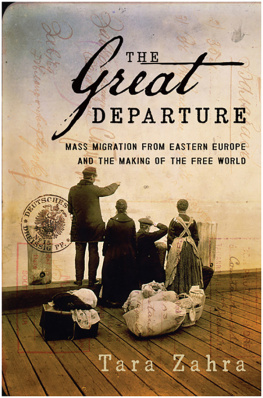
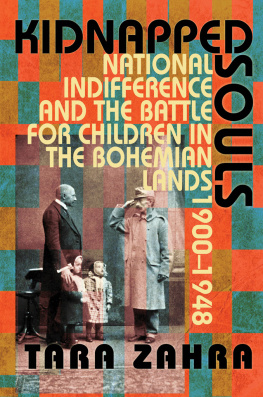


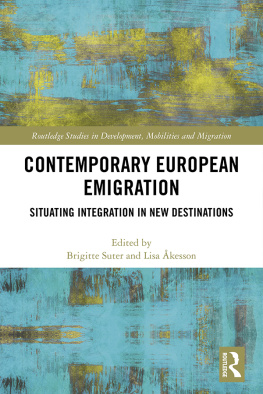
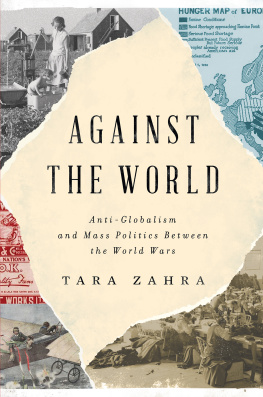
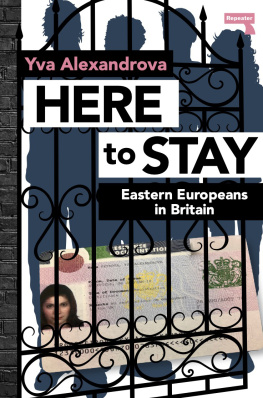
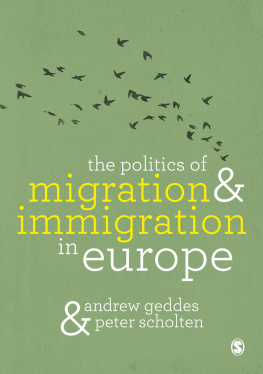


 niewska was counting the days until she could return home. I do not understand how the people there look upon this America, she wrote to her parents. They think that a country like America is made of gold. This is not a golden country, but a new one,... and here they exploit people as they did the Jews in Pharaohs time, 12 hours work a day. Faustina, a recent Polish immigrant, was not impressed by electric lights or by the Statue of Liberty. Assaulted by the sounds, sights, and foul smells of New York City, she moaned, Oh, how lonely I am! Here you only hear the noise of thousands of people walking, of the whistling of factories, of the bells of trolleys... in place of nightingales and larks. Instead of roses, tulips, and lilacs, barrels of garbage and covered wagons, and stench instead of fresh air. She had abandoned any fantasy of prosperity, yet her parents constantly nagged her to send money home. She and her husband were living hand to mouth. We cannot live on smelly meat, stale bread, musty cereals.... To live in misery or to kill myself in order to save a grosz, no, I am not that crazy to work myself to death. She refused, on principle, to sacrifice her few daily pleasures in order to support needy
niewska was counting the days until she could return home. I do not understand how the people there look upon this America, she wrote to her parents. They think that a country like America is made of gold. This is not a golden country, but a new one,... and here they exploit people as they did the Jews in Pharaohs time, 12 hours work a day. Faustina, a recent Polish immigrant, was not impressed by electric lights or by the Statue of Liberty. Assaulted by the sounds, sights, and foul smells of New York City, she moaned, Oh, how lonely I am! Here you only hear the noise of thousands of people walking, of the whistling of factories, of the bells of trolleys... in place of nightingales and larks. Instead of roses, tulips, and lilacs, barrels of garbage and covered wagons, and stench instead of fresh air. She had abandoned any fantasy of prosperity, yet her parents constantly nagged her to send money home. She and her husband were living hand to mouth. We cannot live on smelly meat, stale bread, musty cereals.... To live in misery or to kill myself in order to save a grosz, no, I am not that crazy to work myself to death. She refused, on principle, to sacrifice her few daily pleasures in order to support needy